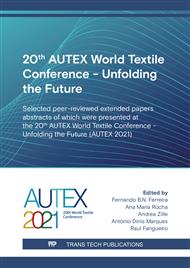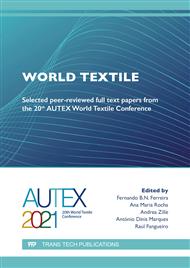p.139
p.149
p.155
p.163
p.169
p.175
p.185
p.191
p.201
Time as Challenge in Textile Industry: Issues of Education, Culture and Science
Abstract:
The textile industry has developed throughout the 21st century highly sustained by the accuracy of time control, reduction of waiting times and intensification of working time regimes. It is one of the industries where the times and methods were best tested and where mass production model was intensely developed. In parallel, the textile industry followed through a colossal transformation at the level of lifestyles, with the increase diversification of fashion consumption [1]. Currently, the textile industry is associated with various fashion consumer products, in addition to clothing. It is one of the most important in the world, with a relevant impact on the economy, at regional and national levels, such is the case of Portugal. In this context of high acceleration, the paper focus on two important ideas: i) companies are ever more facing the need to adapt to the ever-increasing time flexibility, mobility and fragmentation that characterize young graduates’ expectations and ways of live; ii) these cultural changes on values of time are demanding new modes of organizing and administering time and human resources in the organizations [2].
Info:
Periodical:
Pages:
169-174
DOI:
Citation:
Online since:
July 2022
Authors:
Keywords:
Price:
Сopyright:
© 2022 Trans Tech Publications Ltd. All Rights Reserved
Share:
Citation:



